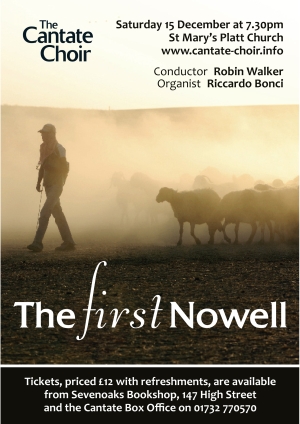7.30pm, Saturday 15 December 2012 – St Mary’s Platt, Borough Green

Soloist
Riccardo Bonci – Organ
Programme
Vaughan Williams – The First Nowell – an Oratorio
Audience carol – O come, all ye faithful
H. Darke – In the bleak mid-winter
W. Byrd – O magnum mysterium
F. Poulenc – Quatre motets pour le temps de Noël
E. Elgar – The Snow
B. Britten – A New Year carol
Audience carol – O little town of Bethlehem
A. Adam – Oh holy night
Programme notes
When the power of love overcomes the love of power, the world will know peace. Anon, on a car bumper sticker
I tried searching for The Christmas Message on the internet to remind myself of the words of the first nowell to the shepherds more than 2,000 years ago. How depressing! Up came any number of suggestions for cloying messages to friends and business associates that will fit your average SMS text allowance. “In the daytime if sun shin so shall Ur espectation come true, At night when moon comes out so shall U recieve blesses”. Someone give him/her a spelling lesson for Christmas, please! What is more depressing is that people expect to find words for every occasion to cut and paste onto Facebook or Twitter or whatever. Just as we buy ready-cut carrots, so we can get ready-cut words, anywhere, anytime. No thinking or knives required!
I know that Cantate audiences expect rather more stimulation of mind and soul and our Christmas programme should provide just that. The First Nowell (or Noël) brought tidings of great joy when the news of the birth of the Son of God was announced to poor shepherds. The word noël is derived through old French from the Latin ‘dies natalis’ (birthday). ‘In all the world religions, angels seem most concerned with calling on us to examine our souls, to improve our treatment of our fellow human beings, to resist passing judgment on others, and to put aside intolerance and prejudice in favor of becoming more loving and forgiving’. (B & S Steiger) But here the message is just pure joy.
Ralph Vaughan Williams set a libretto by Simona Pakenham called The First Nowell as a nativity play, which was first performed at the Theatre Royal, Drury Lane on 19th December 1958. We are performing the concert version, which spares us the sight of the men dressed up in tablecloths and paper crowns or deciding which soprano is the prettiest to play Mary. It consists of some thirteen short movements, which are settings of well-known carols and elements of RVW’s own composition. The music is simple and the message direct. Should you get bored, why not tweet your vote to @mary but please keep phones turned off at all times!
The second half of our programme perhaps tackles the mystery behind the Christmas story. Whether it is Christina Rossetti’s poem In the bleak midwinter, which somehow marries the hugely diverse ideas of Heaven, God’s power and the lowly scene of his arrival on earth, set beautifully and movingly by Harold Darke. Or, the Cantique de Noël (O Holy Night) with complex words by Placide Cappeau de Roquemaure (you couldn’t make it up!) explaining nearly the whole of Christian theology in about five minutes, set nicely, but perhaps tritely, by Adolphe Charles Adam, the composer of the ballet Giselle.
The Snow by Edward Elgar is an 1894 setting of words by his wife Alice and dedicated in characteristically English fashion to Mrs E. B. Fitton of Malvern. If Alice had not been his wife, Elgar would probably not have touched this poem with a bargepole. It gets few marks for eloquence or depth but the sentiment is fine. Our hearts and souls should be pure like the snow but, unlike snow, our purity should endure all our lives. Elgar breathes life into her words with his gift for melody settled on strong harmonic structures.
William Byrd was also a master of melodic and harmonic invention writing his Christmas Motet O Magnum Mysterium nearly three hundred years earlier. These words place greater emphasis on Mary, Mother of God, who was herself subject to an angelic messenger, nine months earlier. Byrd seems to be able to build up layers of music effortlessly to bring out the depths of meaning in the words. In this version, we repeat the Beata Virgo section and then return to the beginning once again. The words and translation are reproduced here.
O magnum mysterium et admirabile sacramentum,
ut animalia viderent Dominum natum jacentem in praesepio.
Beata Virgo, cujus viscera meruerunt portare Dominum Jesum Christum.
Ave Maria, gratia plena: Dominus tecum.
O great mystery, and wonderful sacrament,
that animals should see the new-born Lord lying in a manger!
Blessed is the Virgin, whose womb was worthy to bear Christ the Lord.
Hail Mary, full of grace: the Lord is with you.
The four Christmas motets by Francis Poulenc are pieces we have performed before and doubtless will again. They are absolute pearls in the choral repertory and so typical of Poulenc’s style. Written in 1951-2 for unaccompanied choir, these are each a perfect miniature, which captures the nature of the traditional Latin texts with extraordinary precision and finesse. Not a single note, rest, dynamic or accent is out of place. Like an admired gem setting, each is understated so as not to be garish yet is subtle and rich enough to be breathtakingly beautiful. That is the music of Poulenc.
Four Motets for the season of Christmas
1. O magnum mysterium
O magnum mysterium, et admirabile sacramentum,
ut animalia viderent Dominum natum, jacentem in praesepio!
Beata Virgo, cujus viscera meruerunt portare Dominum Christum.
O great mystery, and wonderful sacrament,
that animals should see the new-born Lord, lying in a manger!
Blessed is the Virgin whose womb was worthy to bear Christ the Lord.
2. Quem vidistis
Quem vidistis, pastores, dicite, annunciate nobis, in terris quis apparuit?
Natum vidimus et choros angelorum collaudantes Domino.
Dicite quidam vidistis et annuntiate Christi nativitatem
Whom did you see, shepherds, tell us, proclaim to us: who has appeared on the earth?
We saw the newborn child and choirs of angels praising the Lord.
Tell us how it happened, and announce the news of Christ’s birth.
3. Videntes stellam
Videntes stellam, Magi gravisi sunt gaudio magno:
et intrantes domum obtulerunt Domino aurum, thus, et myrrham.
When they saw the star the wise men were greatly delighted,
and they entered the house and offered to the Lord gold, frankincense, and myrrh.
4. Hodie Christus natus est
Hodie Christus natus est, hodie Salvator apparuit:
hodie in terra canunt Angeli, laetantur Archangeli:
hodie exsultant justi, dicentes:
Gloria in excelsis Deo, alleluja.
Today is Christ born; today the Saviour has appeared;
today the Angels sing, the Archangels rejoice;
today the righteous rejoice, saying:
Glory to God in the highest. Alleluia!
Sara Kemsley

